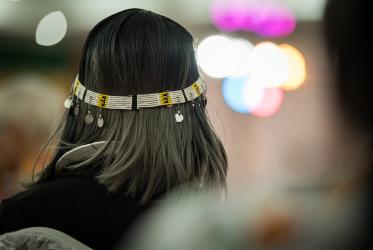By Susan Kim (*)
Climate change alters life in coastal Greenland
While Bishop Sofie Petersen can talk convincingly about the science behind climate change, she'd rather talk about what's happening to the people in her home region of Greenland.
Serving the Evangelical Lutheran Church in Denmark, Petersen lives in the same coastal Greenland community where she grew up.
“Right now there are two churches, built on the coastal areas of Greenland, with foundations that are bowing and bending because the permafrost is disappearing in our country, and great parts of the land are shifting,” she said.
There is no way to save the buildings structurally, she added. “These churches will have to move.”
Petersen considers herself part of a community of Indigenous Peoples in Greenland. She grew up with a deep understanding of the hunting and fishing culture that still surrounds her. “We feel the impacts of climate change because many of our church members are hunters and fishermen who have to work in extreme weather conditions. Their wives and children are deeply impacted, too.”
The shrimp population continues to diminish, while schools of fish not native to Greenland are moving in. “The fishermen have had to change their equipment,” she said.
Extremes are worsening
For Indigenous Peoples, who Petersen says live “closer to nature,” climate change has affected animal habitats in ways that are not just odd but alarming to some. “For example, the polar bears are coming into the towns, into populated areas because they are hungry.”
Through her work on the WCC Central Committee, a WCC governing body, Petersen has been able to share the stories of Indigenous Peoples from Greenland and to hear news from Indigenous Peoples in other regions as well. “We have seen it in Canada, in Alaska – houses going into the sea.”
Petersen has a deep connection to her community. Her father was a pastor, and she realized at the age of 11 that she wanted to become a pastor, too. “I can't think of doing anything else,” she said.
Petersen believes that Indigenous Peoples can tell their story and help the rest of the world better understand global warming. “It's a big issue all over the world,” she said.
What Petersen most wishes people understood is that climate change doesn't necessarily result in warmer temperatures during all seasons. “It means the weather extremes are worse – it is colder and it is warmer, and the extremes just grow more extreme. I wish people understood this better. In Greenland, now it rains like in Denmark. In Denmark, now it rains like in the tropics. No matter what country you live in – it's coming.”
(*) Susan Kim is a freelance writer from Laurel, Maryland, United States.





